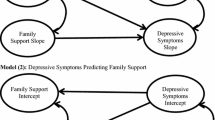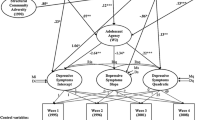Abstract
The current study examined the role of engaged parenting in explaining longitudinal associations between maternal perceptions of social network support and whether youth engage in delinquent behaviors during the transition into adolescence. The sample included 432 low-income, African American and Latino youth (49% female) and their mothers participating in “Welfare, Children, and Families: A Three City Study”. Results from longitudinal SEM analyses demonstrated that social network support was associated positively with mothers’ engaged parenting as youth transitioned into early adolescence. Engaged parenting, which functioned as a mediating variable, was associated with less youth delinquency during transitions into middle adolescence. Taken together, social network supports appeared to facilitate mothers’ abilities to remain engaged with their children and to deter youth from becoming involved in delinquent behaviors.


Similar content being viewed by others
References
Allen, J. P., Moore, C., & Kuperminc, G. P. (1997). Developmental approaches to adolescent deviance. In S. Luthar, J. A. Burrack, C. Cicchetti, & J. Weisz (Eds.), Developmental psychopathology: Perspectives on risk and disorder (pp. 548–567). New York: Cambridge University Press.
Amato, P. R., & Fowler, F. (2002). Parenting practices, child adjustment, and family diversity. Journal of Marriage and Family, 64, 703–716.
Barber, B. K., & Schluterman, J. M. (2008). Connectedness in the lives of children and adolescents: A call for greater conceptual clarity. Journal of Adolescent Health, 43, 209–216.
Baron, R. M., & Kenny, D. A. (1986). The moderator-mediator variable distinction in social psychological research: Conceptual, strategic, and statistical considerations. Journal of Personality and Social Psychology, 51, 1173–1182.
Belsky, J. (1984). The determinants of parenting: A process model. Child Development, 55, 83–96.
Beyer, S. (1995). Maternal employment and children’s academic achievement: Parenting styles as mediating variable. Developmental Review, 15, 212–253.
Black, M. M., Dubowitz, H., & Starr, R. H., Jr. (1999). African American fathers in low-income, urban families: Development, behavior, and home environment of their three-year-old children. Child Development, 70, 967–978.
Borus, M. E., Carpenter, S. W., Crowley, J. E., & Daymont, T. N. (1982). Pathways to the future, Vol II: A final report on the National Survey of youth labor market experience in 1980. Columbus, OH: Center for Human Resource Research, The Ohio State University.
Bost, K. K., Cox, M. J., Burchinal, M. R., & Payne, C. (2002). Structural and supportive changes in couples’ family and friendship networks across the transition to parenthood. Journal of Marriage and Family, 64, 517–531.
Brooks-Gunn, J., Duncan, G. J., & Aber, J. L. (Eds.). (1997). Neighborhood poverty. New York: Russell Sage Foundation.
Browne, M. W., & Cudeck, R. (1993). Alternative ways of assessing model fit. In K. A. Bollen & J. S. Long (Eds.), Testing structural equation models (pp. 136–162). Newbury Park, CA: Sage.
Burchinal, M. R., Follmer, A., & Bryant, D. M. (1996). The relations of maternal social support and family structure with maternal responsiveness and child outcomes among African American families. Developmental Psychology, 32, 1073–1083.
Cabrera, N., Fitzgerald, H. E., Bradley, R. H., & Roggman, L. (2007). Modeling the dynamics of paternal influences on children over the life course. Applied Developmental Science, 11, 185–189.
Call, K. T., & Mortimer, J. T. (2001). Arenas of comfort in adolescence: A study of adjustment in context. Mahwah, NJ: Lawrence Erlbaum.
Ceballo, R., & McLoyd, V. C. (2002). Social support and parenting in poor, dangerous neighborhoods. Child Development, 73, 1310–1321.
Cherlin, A. J. (1999). Welfare, children and families: A three-city study, wave 1 (Data Set 01-04, Ruiz, R. O., McKean, E. A., & Peterson, J. L.) machine-readable data file and documentation. Johns Hopkins University (Producer). Los Altos, CA: Sociometrics Corporation, Child Well-being and Poverty Data Archive (Producer & Distributor).
Cheung, G. W., & Rensvold, R. B. (2002). Evaluating goodness-of-fit indexes for testing measurement invariance. Structural Equation Modeling, 9, 233–255.
Crnic, K. A., Greenberg, M. T., & Slough, N. M. (1986). Early stress and social support influences on mothers’ and high-risk infants’ functioning in late infancy. Infant Mental Health Journal, 7, 19–33.
Derogatis, L. R. (1982). BSI: Administration, scoring, and procedures manual for the brief symptom inventory (1st ed.). Minneapolis, MN: National Computer Systems.
Diemer, G. A. (1997). Expectant fathers: Influence of perinatal education on stress, coping, and spousal relations. Research in Nursing and Health, 20, 281–293.
Duncan, G. J., & Brooks-Gunn, J. (2000). Family poverty, welfare reform, and child development. Child Development, 71, 188–196.
Gee, C. B., & Rhodes, J. E. (2007). A social support and social strain measure for minority adolescent mothers: A confirmatory factor analytic study. Child: Care, Health and Development, 34, 87–97.
Gold, M. (1970). Delinquent behavior in an American city. Belmont, CA: Brooks/Cole.
Green, B. L., Furrer, C., & McAllister, C. (2007). How do relationships support parenting? Effects of attachment style and social support on parenting behavior in an at-risk population. American Journal of Community Psychology, 40, 96–108.
Hafen, C. A., & Laursen, B. (2009). More problems and less support: Early adolescent adjustment forecasts changes in perceived support from parents. Journal of Family Psychology, 23, 193–202.
Harrison, A. O., Wilson, M. N., Pine, C. J., Chan, S. Q., & Buriel, R. (1990). Family ecologies of ethnic minority children. Child Development, 61, 347–362.
Haynie, D. L., & South, S. J. (2005). Residential mobility and adolescent violence. Social Forces, 84, 361–374.
Hu, L., & Bentler, P. M. (1999). Cutoff criteria for fit indexes in covariance structure analysis: Conventional criteria versus new alternatives. Structural Equation Modeling, 6, 1–55.
Jarrett, R. L. (1995). Growing up poor: The family experiences of socially mobile youth in low-income African American neighborhoods. Journal of Adolescent Research, 10, 111–135.
Jones, D. J., Forehand, R., Rakow, A., Colletti, C. J. M., McKee, L., & Zalot, A. (2008). The specificity of maternal parenting behavior and child adjustment difficulties: A study of inner-city African American families. Journal of Family Psychology, 22, 181–192.
Keijsers, L., Frijns, T., Branje, S. J. T., & Meeus, W. (2009). Developmental links of adolescent disclosure, parental solicitation and control with delinquency: Moderation by parental support. Developmental Psychology, 45, 1314–1327.
Kierkus, C. A., & Baer, D. (2002). A social control explanation of the relationship between family structure and delinquent behavior. Canadian Journal of Criminology, 44, 425–458.
Kierkus, C. A., & Hewitt, J. D. (2009). The contextual nature of the family structure/delinquency relationship. Journal of Criminal Justice, 37, 123–132.
Kishton, J. M., & Widaman, J. F. (1994). Unidimensional versus domain representative parceling of questionnaire items: An empirical example. Educational and Psychological Measurement, 54, 757–765.
Laird, R. D., Pettit, G. S., Bates, J. E., & Dodge, K. A. (2003). Parents’ monitoring-relevant knowledge and adolescents’ delinquent behavior: Evidence of correlated developmental changes and reciprocal influences. Child Development, 74, 752–768.
Laursen, B., & Collins, A. (2009). Parent-child relationships during adolescence. In R. M. Lerner & L. Steinberg (Eds.), Handbook of adolescent psychology: Vol. 2. Contextual influences on adolescent development (pp. 3–42). Hoboken, NJ: Wiley.
Levitt, M. J., Guacci-Franco, N., & Levitt, J. L. (1993). Convoys of social support in childhood and early adolescence: Structure and function. Developmental Psychology, 29, 811–818.
Little, T. D. (1997). Mean and covariance structures (MACS) analyses of cross-cultural data: Practical and theoretical issues. Multivariate Behavioral Research, 32, 53–76.
Little, T. D., Cunningham, W. A., Shahar, G., & Widaman, K. F. (2002). To parcel or not to parcel: Exploring the question, weighing the merits. Structural Equation Modeling, 9, 151–173.
Little, T. D., Slegers, D. W., & Card, N. A. (2006). A non-arbitrary method of identifying and scaling latent variables in SEM and MACS models. Structural Equation Modeling, 13, 59–72.
Lyons, S. J., Henly, J. R., & Schuerman, J. R. (2005). Informal support in maltreating families: Its effect on parenting practices. Children and Youth Services Review, 27, 21–38.
MacKinnon, D. P., Lockwood, C. M., Hoffman, J. M., West, S. G., & Sheets, V. (2002). A comparison of methods to test mediation and other intervening variable effects. Psychological Methods, 7, 83–104.
Manongdo, J. A., & Garcia, J. I. R. (2007). Mothers’ parenting dimensions and adolescent externalizing and internalizing behaviors in a low-income, urban Mexican American sample. Journal of Child and Adolescent Psychology, 36, 593–604.
Marshall, N. L., Noonan, A. E., McCartney, K., Marx, F., & Keefe, N. (2001). It takes an urban village. Journal of Family Issues, 22, 163–182.
McLoyd, V. C. (1990). The impact of economic hardship on Black families and children: Psychological distress, parenting, and socioemotional development. Child Development, 61, 311–346.
Muthén, L. K., & Muthén, B. O. (2009). Mplus (Version 5.21) [computer program]. Los Angeles, CA.
Orthner, D. K., & Neenan, P. (1996). Children’s impact on stress and employability of mothers in poverty. Journal of Family Issues, 17, 667–687.
Pallock, L. L., & Lamborn, S. D. (2006). Beyond parenting practices: Extended kinship support and the academic adjustment of African–American and European–American teens. Journal of Adolescence, 29, 813–828.
Pinderhughes, E. E., Nix, R., Foster, E. M., Jones, D., & The Conduct Problems Prevention Research Group. (2001). Parenting in context: Impact of neighborhood poverty, residential stability, public services, social networks, and danger on parental behaviors. Journal of Marriage and Family, 63, 941–953.
Preacher, K. J., & Hayes, A. F. (2008). Asymptotic and resampling strategies for assessing and comparing indirect effects in multiple mediator models. Behavior Research Methods, 40, 879–891.
Roche, K. M., Ensminger, M. E., & Cherlin, A. J. (2007). Variations in parenting and adolescent outcomes among African American and Latino families living in low-income, urban areas. Journal of Family Issues, 28, 882–909.
Sarason, I. G., Sarason, B. R., & Pierce, G. R. (1990). Social support: The search for theory. Journal of Social and Clinical Psychology, 9, 133–147.
Selig, J. P., & Preacher, K. J. (2009). Mediation models for longitudinal data in developmental research. Research in Human Development, 6, 144–164.
Simons, R. L., Lorenz, F. O., Wu, C., & Conger, R. D. (1993). Social network and marital support as mediators and moderators of the impact of stress and depression on parental behavior. Developmental Psychology, 29, 368–381.
Stattin, H., & Kerr, M. (2000). Parental monitoring: A reinterpretation. Child Development, 71, 1072–1085.
Steinberg, L. (2001). We know some things: Parent-adolescent relationships in retrospect and prospect. Journal of Research on Adolescence, 11, 1–19.
Steinberg, L., Mounts, N., Lamborn, S., & Dornbusch, S. (1991). Authoritative parenting and adolescent adjustment across various ecological niches. Journal of Research on Adolescence, 1, 19–36.
Taylor, R. J., Casten, R., & Flickinger, S. M. (1993). Influences of kinship social support on the parenting experiences and psychosocial adjustment of African-American adolescents. Developmental Psychology, 29, 382–388.
Winston, P., Angel, R. J., Burton, L. M., Chase-Lansdale, P. L., Cherlin, A. J., Moffitt, R. A., et al. (1999). Welfare, children and families: A three-city study: Overview and design. Accessed on July 10, 2007. Available at http://web.jhu.edu/threecitystudy/Publications/index.html.
Author information
Authors and Affiliations
Corresponding author
Rights and permissions
About this article
Cite this article
Ghazarian, S.R., Roche, K.M. Social Support and Low-Income, Urban Mothers: Longitudinal Associations with Adolescent Delinquency. J Youth Adolescence 39, 1097–1108 (2010). https://doi.org/10.1007/s10964-010-9544-3
Received:
Accepted:
Published:
Issue Date:
DOI: https://doi.org/10.1007/s10964-010-9544-3




